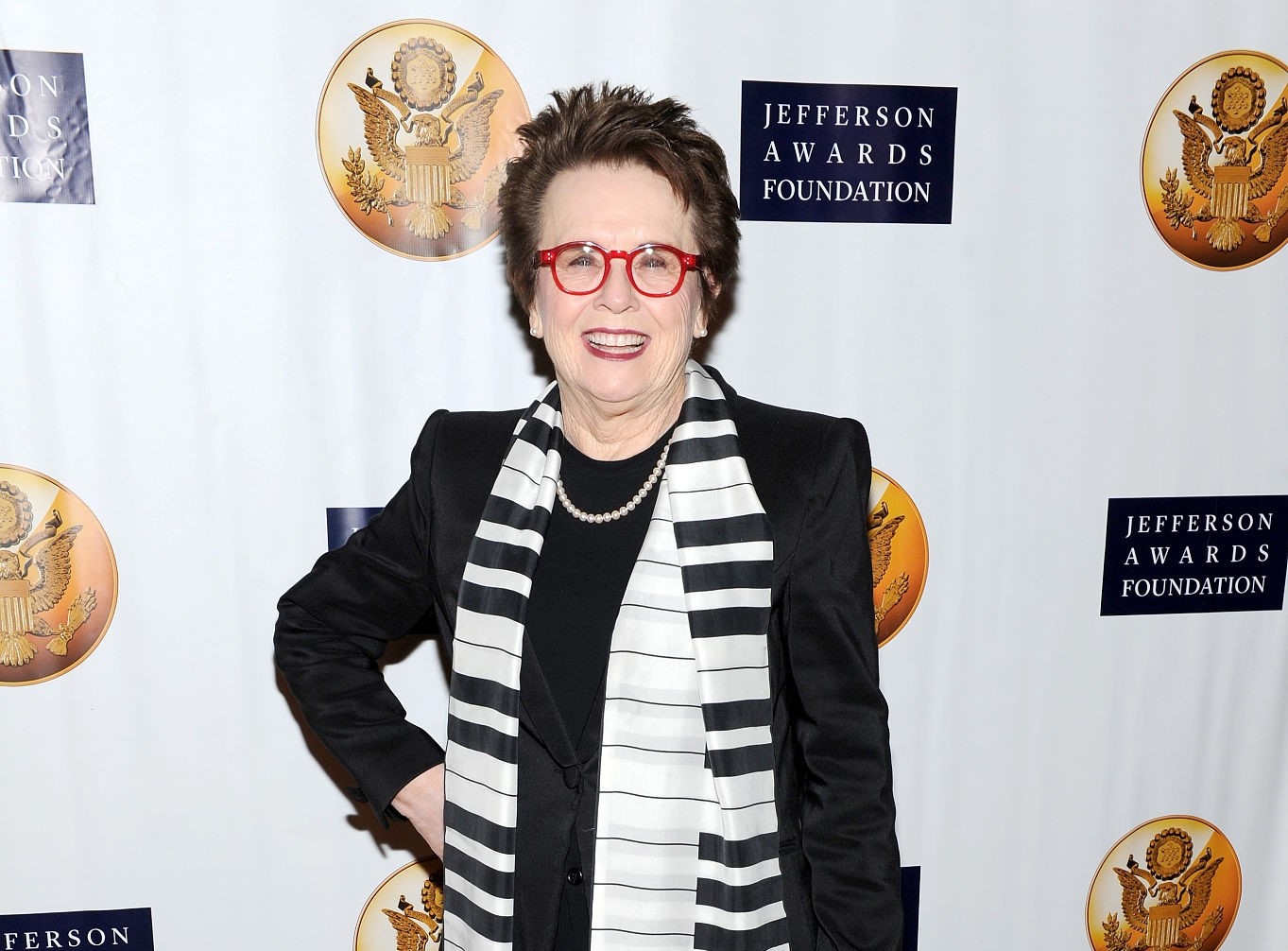
This Women’s History Month, we honor Billie Jean King, a tennis legend and fierce advocate for social justice and equality. Named one of the “100 Most Important Americans of the 20th Century” by Life Magazine in 1990, King was Appointed Global Mentor for Gender Equality by UNESCO in 2008. In 2009, King was the first female athlete to be honored with the Presidential Medal of Freedom. President Obama bestowed the award on King for her work advocating for the rights of women and the lesbian, gay, bisexual, and transgender community.
King began playing tennis at the age of 11 in public parks in Southern California and began competing four years later at local, regional, and international tennis championships. In 1966, King won the first of her six singles titles at Wimbledon and grew in stature and respect with each subsequent competition.
Fed up with the grossly unequal prize money for male and female tennis players (typically men earned between 6 and 12 times as much as women), Billie Jean King joined a breakaway women’s tennis tour in 1970. Called the Virginia Slims Circuit, the tour was equal parts defiant admonition of the male dominated tennis establishment and a telling precursor of her leadership to come.
In her 1988 book “We Have Come a Long Way”, King explains her impetus for her activism at the time. “The women were being squeezed financially because we had no control in a male-dominated sport. Men owned, ran and promoted the tournaments, and because many of them were former players themselves, their sympathies lay with the male players, who argued vociferously that most of the money should be theirs.”
King, who was just 26 at the time, worked relentlessly alongside her eight teammates to promote the Virginia Slims tour. “The Original Nine” created their own opportunities to play as much as possible, creating the foundation for women’s professional tennis as they did so.
In 1972, King spoke up again, appearing before Congress to testify on behalf of the passage of Title IX, the federal civil rights law that prohibits sex discrimination in all federally funded school programs, including sports. King knew that it was essential that equal access to athletic opportunities for women and girls be enshrined in law.
The same year, King won the US Open, but her prize money was $15,000 less than the men's champion. She spoke out unabashedly about this blatant inequality and used her celebrity status to pressure the US Open to change its policies. Thanks to King’s courageous stand, In 1973, the US Open established equal prize money for both men and women.

Adamant about elevating the profile of professional female tennis players, King formed the Women’s Tennis Association (WTA) in June 1973. The WTA was and remains the preeminent organizing body of women's professional tennis.
Three months later, in September 1973, King played and defeated Bobby Riggs in an exhibition match dubbed “the Battle of the Sexes.” Riggs was a former number 1-ranked tennis player who had turned to playing in promotional challenge matches. He claimed that “Women play about 25 percent as good as men, so they should get about 25 percent of the money men get.” He went on to state that a women’s tennis game was “so inferior to the men’s game” that he could beat any of the current top female players, even as a middle aged man of 55.
On September 20, 1973, over 30,000 spectators and over 140 million national and international television viewers watched the match. The event, viewed as an important moment in the history of women’s sports, showcased the benefits of allowing women equal opportunity to train and develop as athletes. Faced with Riggs’ chauvinistic dismissal, King prepared, stayed focused and defeated Riggs 6–4, 6–3, 6–3, winning the best of five matches, the men’s championship tennis standard instead of the best of three matches, the standard for female players. Having won the $100,000 prize and beaten Riggs on his own terms, King raised the profile of professional women’s sports within a year of Title IX being signed into law.
In 1974, Billie Jean King built on her previous advocacy work to found The Women's Sports Foundation. Among other forms of support, the foundation offers grants to young athletes. In 1980, King was inducted into the Women’s Sports Hall of Fame and in 1984, she became the first woman commissioner of World TeamTennis League, an American mixed gender professional tennis league which she co-founded ten years earlier. The League’s goal is to “give equal weight to each man and woman competing for their teams.” In 1990, King was inducted into the National Women’s Hall of Fame.
For the next fifteen years, King continued to use her global influence to advance the dialogue around equity for women, female athletes and LGBTQ individuals. This work led to the development of the Billie Jean King Leadership Initiative, a non-profit King co-founded in 2014 with her wife Ilana Kloss. The Initiative is dedicated to creating a “world where workplaces are free of discrimination and inequality.”
On the BJKLI website, King explains that the Initiative’s approach to creating change is centered on listening, learning, and leading. The Initiative is “dedicated to inspiring future leaders, where we hope to motivate people and those in positions of power to promote diverse identities and challenge the status quo. With your help, we can reach the next generation, and together we will build a more inclusive, respectful society.” King’s dedication to supporting the next generation of leaders aligns her directly with Multiplying Good’s core mission.
In 2016, Multiplying Good awarded Billie Jean King a Lifetime Achievement in Public Service award. This Women's History month, we remain awed and inspired by Billie Jean King’s advocacy on behalf of women and girls everywhere. Thank you for being such a powerful example of what good can be produced when we commit to service beyond ourselves.


